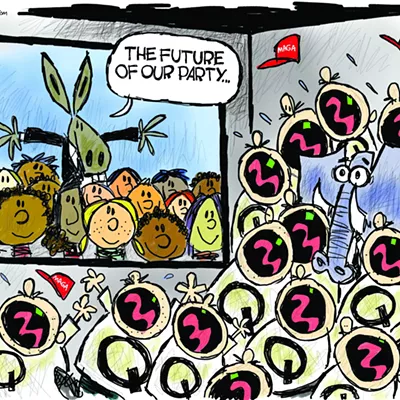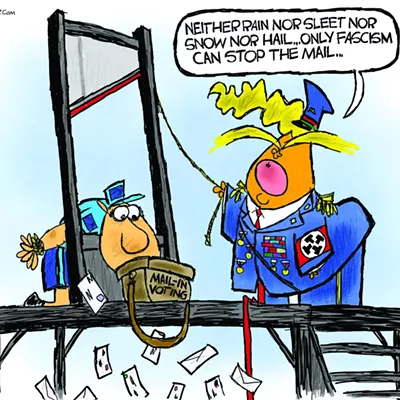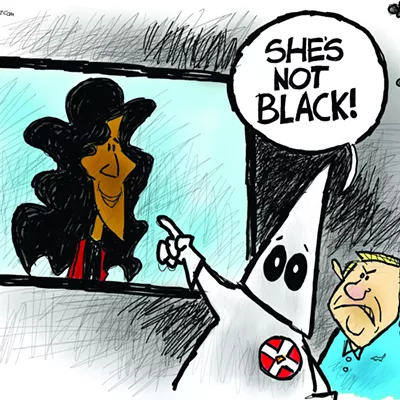In a memo released May 23, McLaughlin laid out new guidelines to govern what candidates can say during newspaper, radio and television interviews, warning that if they talk about why voters should support them, they run the risk of turning the interview into a campaign contribution.
The legal wrangling dates back to May 2001, when McLaughlin responded to a question from Councilman Fred Ronstadt regarding whether an appearance on a radio show would constitute a campaign contribution. McLaughlin concluded that "during the 16 weeks immediately preceding a city general election, an incumbent's invited, no-cost appearance on a radio talk show is a contribution by the radio station to the incumbent and should be so reported."
Over the last two years, McLaughlin has continued to clarify--if that's what you want to call it--his opinion. In last week's memo, he explains, "a candidate's newspaper interview, or radio or television appearance, may become a contribution to the candidate by the newspaper or radio or television station if the candidate, or the interviewer or host, uses the appearance to expressly advocate for or against any candidate" through statements as simple as "vote for" or "elect."
Since local papers traditionally invite candidates to a sit-down before writing their endorsements, those editorials may now count as campaign contributions. Under McLaughlin's guidelines, the newspapers can only safely endorse candidates if they don't interview them.
McLauglin's final bit of advice: "Use Common Sense. In the final analysis, candidates and the media involved must make common sense distinctions between speech that advocates the election or defeat of a candidate and informational or news programming presenting discussion or information about candidates. The guidelines and examples presented here are designed to aid in, and not to substitute for, that process."
Midtown resident Benny White says common sense was abandoned long ago.
"I don't understand the city attorney's perspective of trying to limit people's ability to freely express their political opinions," says White, a GOP activist who last year worked on Republican Ross Hieb's hopeless effort against Democrat Raúl Grijalva in Congressional District 7 and Republican Matt Salmon's unsuccessful gubernatorial run. His wife, Judi White, is helping Republican Armando Rios' run against Democratic Councilman José Ibarra in this year's Ward 1 council race.
It might all be pointless legal sparring except for two things: First, state law forbids corporate campaign contributions.
"It's illegal for a corporation like the John C. Scott Show or KTKT to make a contribution," says White. "It's also illegal, under state statute, for a campaign to accept that contribution."
Secondly, most candidates in Tucson elections participate in the city's matching funds program, which provides a dollar-for-dollar match for candidates who agree to limit their spending. Exceeding that limit, which is roughly $160,000 for this year's mayoral contest, can lead to a council member being tossed out of office.
"It just creates a trap out there," White says. "The city clerk or the city attorney at their discretion could decide that somebody is going to be removed from the ballot or removed from office. Now there'd be a hell of a court fight in that event, but if they declared that somebody was going to be removed from office, that completely negates the will of the voters. That's my bottom line on all of this stuff."
White complains that McLaughlin's opinions are already having a chilling effect: Councilwoman Carol West, who is seeking reelection in Ward 2 against Lianda Ludwig in September's Democratic primary, has already told radio show host John C. Scott she won't be appearing on his show once the campaign season is underway to avoid potential legal trouble.
An airline pilot who's attending an Internet law school, White also questions whether the opinion can be limited to comments made by a candidate or a member of the media. "The city attorney wants to limit this ruling to just actions by the candidates, but that won't work either, because express advocacy can be made by anybody," says White, who points out that the case law that McLaughlin cites in his opinion, Federal Election Commission v. Furgatch, regards not a candidate but an individual who ran a newspaper advertisement.
Moreover, White complains, enforcement is, at best, impractical. For starters, there's the question of how to assign a value to endorsements. Is an endorsement from John C. Scott worth more than an endorsement from the Tucson Weekly? Is an endorsement from Pima County Sheriff Clarence Dupnik worth more than an endorsement from Joe Sweeney?
White has sent copies of McLaughlin's memos to state Sen. Jim Weiers, who chairs the Senate Judiciary Committee, in hopes that Weiers will be able to persuade Attorney General Terry Goddard to review the opinion. Otherwise, it'll be up to a citizen to file a legal challenge.
"All of this stuff could get resolved through a court case, but I just don't have the $100,000 to walk this case up to the Supreme Court," White says. "I'd like for my government to not cost me that kind of money."










